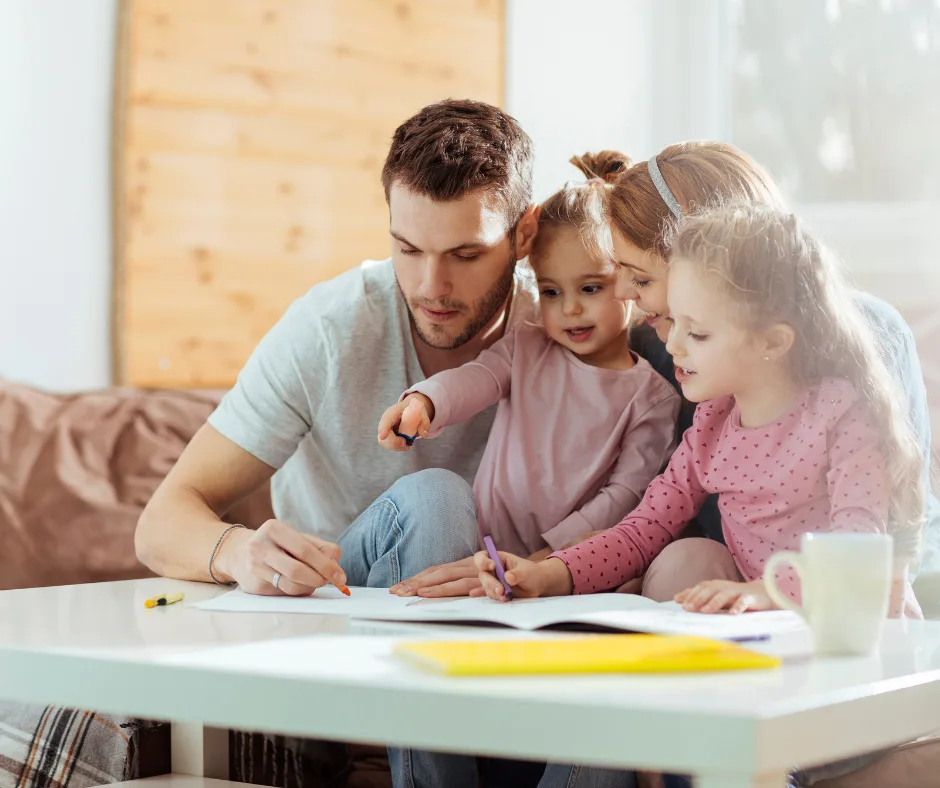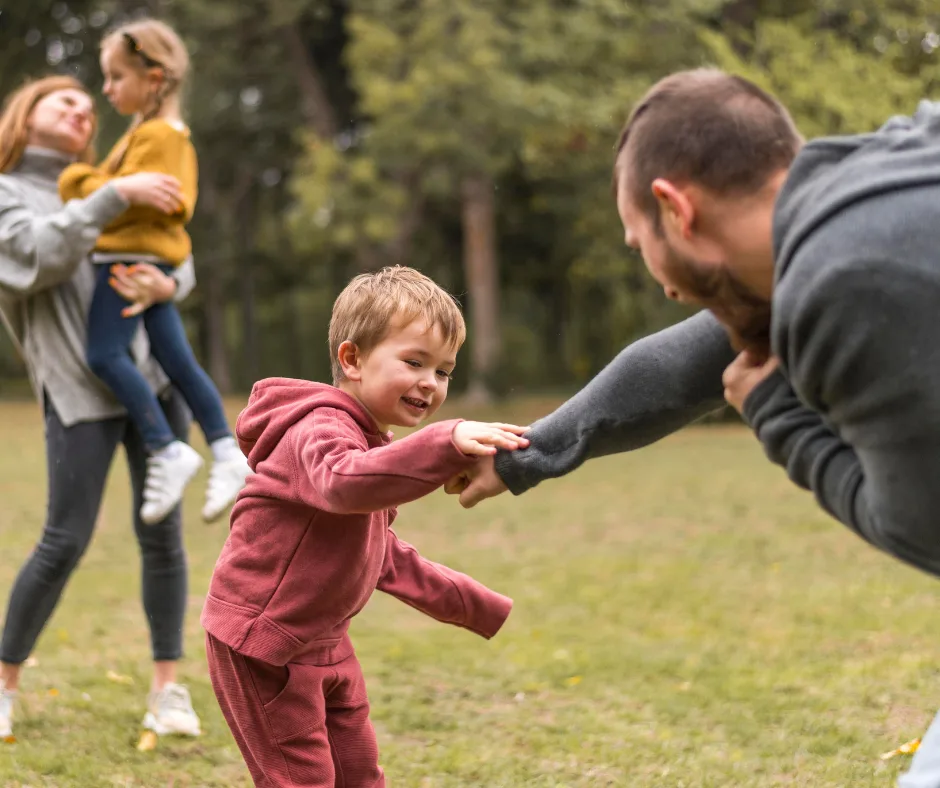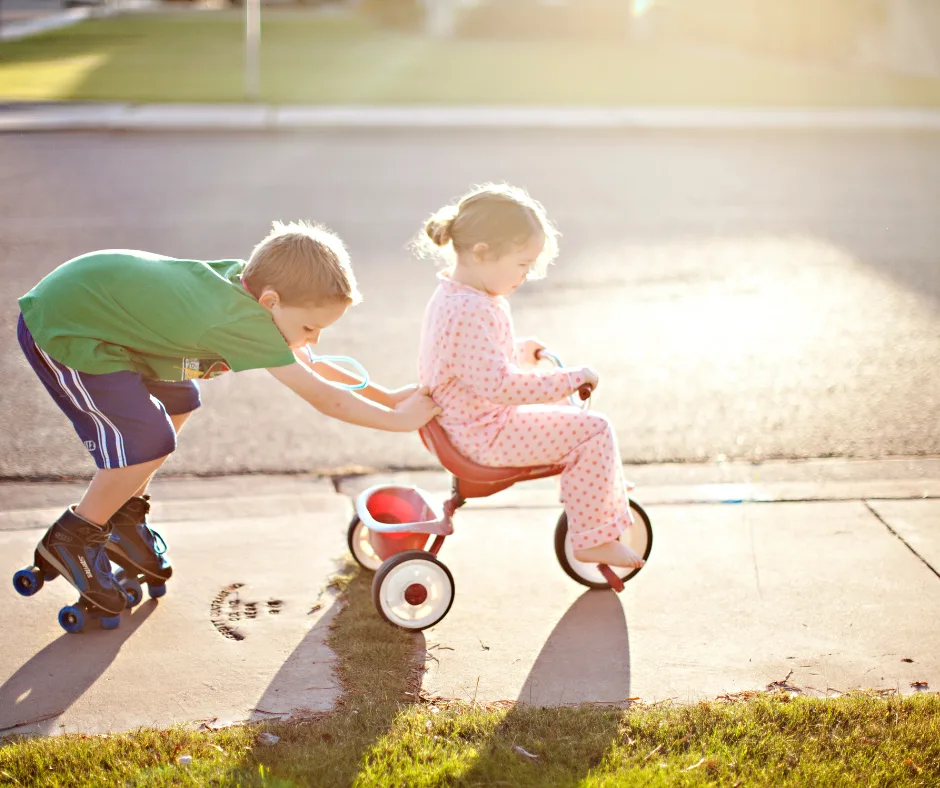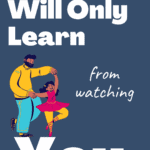Our parenting choices can have a lasting impact on our children’s lives. Learn more about the behaviors that are learned from watching their parents and how to be an informed parent today!
Have you ever met the parents of a bully and instantly thought “Okay, now THAT makes sense”?
Or, do you ever hear your kid yelling while playing house or family and think “Ew, is that what I sound like to my kid”?
The fact is, just like the phrase “Like father, like son” or “she get it from her mama” elude to, kids are always watching like little ninjas and always absorbing behaviors like tiny sponges.
Studies show that even 6 month old babies are able to differentiate emotions based on observing their parents’ facial expressions.
Let’s learn more about which behaviors are often learned from caregivers and how to be an informed parent right away.

7 Behaviors Kids Learn from Watching Parents
As a parent, you can have an enormous influence on the lives of your children. Many behaviors and values are passed from one generation to the next through learned behavior — traits that are acquired by watching and imitating what their parents do.
Let’s explore 7 behaviors that are learned simply by watching parents.
1) The Way You Treat YOURSELF
Most of us have an idea of how we should treat other people (though we don’t always practice what we know), but our kids are always watching how you treat yourself.
When your children watch you, they learn about self-respect and how people should treat them just by observing your behavior.
Be sure to practice healthy boundaries, demonstrate self-care in front of your children, and extend compassion toward yourself. This will empower your kids to also build emotional intelligence and know how to treat themselves correctly.
Related: Avoid Raising Another Generation of People-Pleasers with These Tips and Learn about Stopping Mom Guilt here.
2) How to Deal with Conflict
When my husband and I argue or disagree, we talk through our issues and grievances in front of our children.
By displaying how to disagree, manage anger and stress, and ultimately find a resolution to a conflict, our kids learn these important skills as well.
Show them the importance of considering different perspectives but also setting boundaries when it comes to disagreements. This will help them have healthy relationships in their personal and professional lives.
Want to impact how conflict behaviors are learned? Try these Conflict Resolution Worksheets for kids
3) The Manner You Talk About Others Behind their Back
We’ve all heard of the adage, “If you don’t say something nice, don’t say it at all.”
As parents, being careful with our words can ensure that our kids learn to be kind and empathetic when it comes to discussing others.
Teaching them to be mindful of using words that aren’t hurtful or offensive will help them build strong relationships when they grow up. Avoid speaking negatively about your kid’s teachers, coaches, and friends.
Even if someone is wrong, annoying, or rude – verbally try to explain to your children how they may feel. For example, “I know that lady cut in front of us in the grocery store, but maybe she was late or didn’t see us.”
Learn how to Raise Humble Kids with These Humility Lessons.

You may also like: How to Project Positive Energy onto Your Kids
4) How You Cope with Anger and Stress
Parents are often excellent arbitrators when it comes to teaching their children how to effectively cope with anger and stress.
Showing them how to express emotions in a constructive way, rather than resorting to lashing out or acting out, will aid them in resolving issues more efficiently. Model strong problem-solving skills and demonstrate the power of effective communication whenever possible. If you can’t at the moment, leave the room and take a quick break.
Encouraging deep breathing, physical activity, meditation, or journaling can also teach children valuable coping mechanisms that they can carry into adulthood.
Start with these Anger Management Coping Skills for Kids or these mindfulness hack for parents.
5) Everything About Communicating in Relationships
Parents have a huge impact when it comes to teaching their children how to maintain positive relationships.
Our kids learn to communicate and build relationships by observing us, so the best way to set the example is by showing respect and kindness in your conversations with others. Encourage your children to listen actively, be openly honest, and show empathy whenever possible.
Learning these skills at a young age will help to ensure that they are confident communicators in all aspects of life.
6) Your Spiritual Beliefs
While spirituality can be related to religion, it doesn’t have to be.
In the most basic terms, spirituality is the concept that we are all part of something bigger than ourselves. There is more to life than just what we experience on a daily basis with our senses.
While your set of beliefs are entirely up to your family, it is something that will shape your child as they grow into adults.
How we fit into the world is one of the most important behaviors that are learned from parents.
Related: 5 Lessons about Faith and Jesus for Kids

7) How to Put Family First
If you want your children to have strong family values that carry into adulthood, it starts when they are young.
Family first is an important concept in our home.
We want our children to feel that our home is a solid foundation for them to grow on. We can always rely on each other for love, support, and help.
You can do this by simply:
- Making time for just your immediate family to spend time together
- Having anchor routines (or specific traditions everyone expect and look forward to)
- Never putting work, cleaning, or other daily tasks in front of a child who needs something
- Removing distractions when you are together (put the phone down!)
Final Thoughts on Behaviors that are Learned from Parents
These values and behaviors that are learned during childhood will be imprinted upon your little ones.
If you want your child to love themself, treat others with kindness, and deal with all kinds of people and emotions – it starts at home. And it starts right now.
If you follow this advice, when people who know your children meet you, they will think , “Oh, now I see why their kid is so great”.
For more tips on how to raise kids who are healthy at home and strong in the world, follow us on Facebook.


Sandy
Sunday 29th of October 2023
It is so important to raise children who show empathy and kindness to others! Love the part about putting your phone down when with family as it shows the importance of your time together. Great blog!